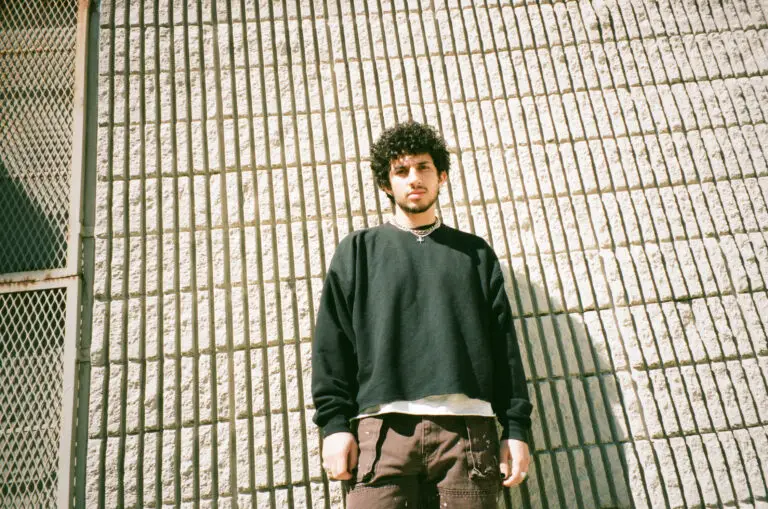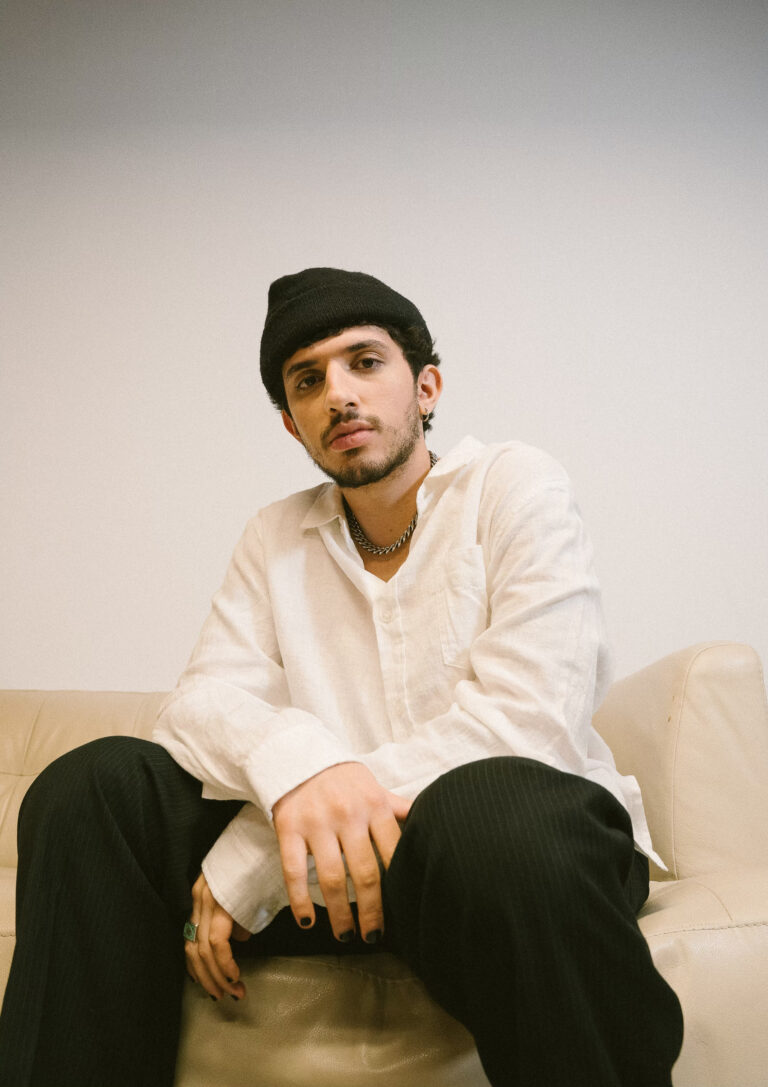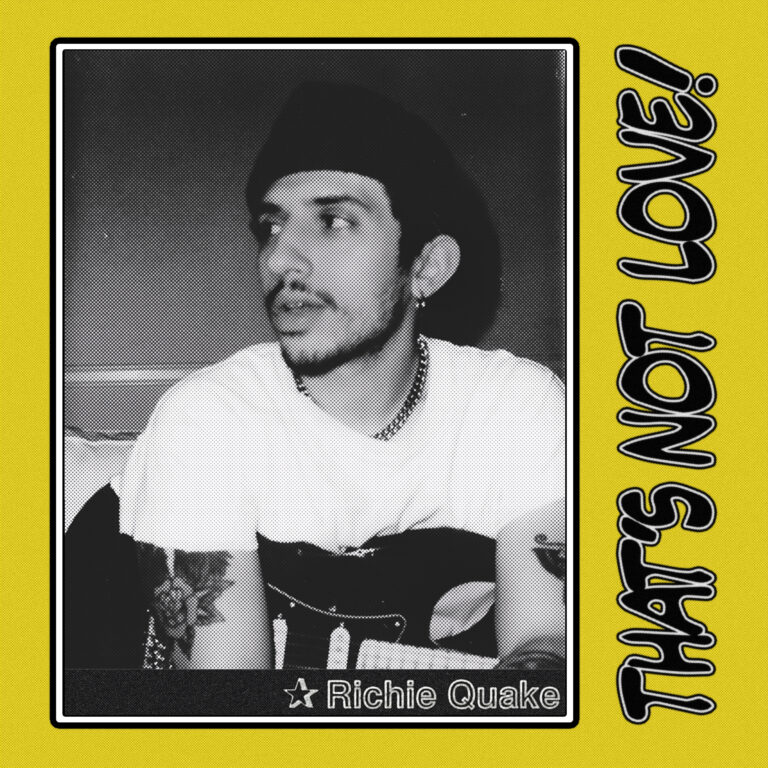In the introduction to her masterpiece on 1980s New York bohemia, The Ballad of Sexual Dependency, the photographer Nan Goldin writes, “I want to show my life as it is. Without glamorization and without glorification.” This commitment to neither life’s imperfections nor its grandiosity is the driving force behind the upcoming debut album from Richie Quake.

With the working title “Glam” and a tentative summer release date, Richie’s work is a treatise not on life’s extremes but on its regularity and consistency. Goldin’s work documented the simple act of being. To her what people did was less important than the fact that they simply were. Richie Quake, in his 21st century version of Goldin’s downtown New York lifestyle hopes to replicate the results.
I want to show what my world looks like, Richie says. Without glamorization or glorification, just kind of exactly as it is.
Who is Richie Quake?
Quake is a musician from Brooklyn teetering on the edge of industry success, having recently signed to Nas’ Mass Appeal Records. He has an effortless cool that either comes from, or led to, his musical upbringing as a New York nightlife DJ. Wearing a white hoodie and black bucket hat, from which peeked his dark brown curls, he has an unaffected nonchalance that oscillates between the warmth of a best friend and the aspirational distance of an older cousin you idolize.
His indie pop music features down tempo synths, a penchant for lyrical simplicity and a prevalence of rock instrumentation, all of which forge a unique sound. A promising start for an artist heading into their debut label release. More than his music what Richie possesses is a direction, a certitude in his artistic vision. He knows what stories he wants to tell. They’re about him, his life, his acts of being—just like Goldin.
There’s no songs about having a million dollars and being at the club and there’s no songs about something that’s like extremely dramatic, or extremely high, or extremely low, Quake relays.
Richie Quake’s Debut Album “Glam”
When I asked him about the new album, he was unusually hesitant to share. His answers suddenly interrupted by long pauses mid-sentence, a wandering gaze away from the Zoom camera, and a –for once — slightly awkward, but still endearing, nervous tilt of the head. He finally cut himself off to say “he had a whole thing” for the album but was unsure how much he wanted to share.
The “whole thing” was Goldin, the Ballad of Sexual Dependency, and New York art scene’s past and present. As soon as Goldin came up, Richie’s mannerisms reverted back to his usual quiet confidence, his knowing eyes and light smile perennial etched on his lips. It was clear he was sharing a long thought about ideas and that these ideas were the organizing principle of his work.
This is my life, Richie says with a deliberate sincerity. This is my friends. This is my relationships. Really what I’m trying to show is really raw humanity in a way that’s not trying to posture as anything else.
Or as Goldin would say, “This is not a bleak world but one in which there is an awareness of pain, a quality of introspection.”

If the vision for Glam is an introspective, yet expository, examination of Richie’s own life then it must also include the people he shares it with; the friends with whom he shares his own self, which ultimately comprises the album’s creative spine.
These pictures may be an invitation to my world, writes Goldin, but they were taken so that I could see the people in them.
Again, Goldin’s work reverberating throughout Richie’s. “How I relate to my feelings, you know, is by characterizing them in in a relationship,” Quake analyzes.
The new New York Music Scene
The self-described “emotional guy” needs the other people in his life to tell the story of himself. It’s a beautiful sentiment, that were it not said with self-effacing honesty, earnestness — and frankly, charm — it might indicate a lack of self-actualization or even co-dependency. Instead, it showcases an artist who is deeply in touch with the core themes of his inspirations. Goldin once said her photography “[came] out of relationships, not observation.” Her talents and creativity extended beyond her work, much like Richie’s. Both contributed to the artistic milieu of New York. Goldin through her almost radical openness and Richie through his own natural gregariousness. In other words, he’s such a cool dude that he’s building a whole scene around him.
“Richie really started to cultivate the scene,” explains Morning Silk, one of Richie’s producers and friends.
Morning Silk is a slightly spacey, experimental musician whose talent as a producer is only exceeded by his admiration for Richie. The two connected through digital happenstance after Morning Silk commented on a Tik Tok Richie made. Richie then took the initiative to scroll through Morning Silk’s profile, get a feel for his music and invited him to a studio session. The two met for the first time at Morning Silk’s makeshift recording studio in Ridgewood, Queens, where they recorded “Never See You”. The song would make its way onto Richie’s latest EP, Voyager. Within two months of meeting one another they would record the entire EP.
As Richie’s stature in the New York music scene grew it brought a newfound drawing power, allowing him to handpick his creative partners. He never cared about their industry status, or even if they were talented—that was table stakes—he cared about their commitment. That is the true entry price to the nascent “alternative rock, indie pop scene.” And it is a price that must be paid daily.
“I float around with a scene of New York creative people who are just all artists,” Richie explains.
I don’t really know anybody who has a job, a nine to five, like a career. Everyone I know is kind of just always in the pursuit of making art and in the pursuit of being creative.
Another of Richie’s frequent collaborators and recent friends is Middle Part. A long haired, slightly schlubby artist whose “super fresh friendship” with Richie regularly consists of “three-day sleepovers.” If Richie is the scene’s guide, then Middle Part is its compass, pointing towards artistic integrity. His disheveled bedroom has the words “Middle Part” spray painted in giant black letters above his bed as if the constant presence of his stage name were a daily reminder of the of the artistic commitment his adopted identity entailed. His gruff attitude belies his deeply emotional music (his superbly crafted single “&Cry” surpassed one million Spotify streams in March) and infectious dedication to an artist’s life. “[Posers] don’t live their art,” Middle Part inveighs.
They don’t actually work hard enough to be considered an artist. You can make music, you can be a painter, you can be a photographer, whatever the fuck but, if you’re not living and dying by it, then what’s the point?
The intensity and matter-of-factness with which he issued his proclamation felt like this was a shared sentiment among the members of New York’s newest music scene, even if the words may have been his alone. It was hard not to feel inspired by his assuredness.
Morning Silk learned to adopt that same dedication from Richie; who was, yet again, guiding his peers, shaping the burgeoning scene in the image of his own values. “Don’t ever do something musically that you don’t want to do,” said Morning Silk, recounting Richie’s advice. “Don’t work with artists you don’t want to work with. It’s a waste of time. Even if you get paid it doesn’t matter. [Richie] was on the brink of being super broke because he did that.”
It’s a classic mark of the creative lifestyle, to believe in an artistic vision even when tangible, everyday realties such as money risk compromising it. If that’s the norm for passionate artists, then being enough of a visionary or talent to spearhead a movement is not. Especially in New York where, since before even the days of Goldin, creatives aspire to participate in an arts scene much less establish one.
“When he’s in a space, you feel comfortable, cool,” confessed an adoring Morning Silk.
Whenever he’s around you it feels right. It feels like you’re doing the right thing, like you’re in the right place. I feel like that’s the best way to describe it.
Richie did so because, aside from his obvious talent, he’s charismatic to the point of inspiring devotion.
It’s a testament to Richie’s qualities as an artist that his collaborators have so fully invested themselves in his own creative vision. But equally an endorsement of the person and his ability to inspire their personal lives as well as their musical lives. The unglamorized “self” that Richie is so fixated on transfusing into his music is of an individual so brimming with confidence that it permeates those in his orbit. Through sheer surety he’s able to alter the self of others. Were Goldin able to photograph Richie and Morning Silk in the recording studio her camera might also capture the invisible shedding of one man’s insecurities through camaraderie alone.
Richie’s Distinct Sound
This indescribable quality he possesses saturates his music, with a distinctiveness as palpable as the one that characterizes the musician. Simply put, it is a vibe.
Not in the contemporary sense, co-opted to describe life’s mundanities “that latte gave me bad vibes” or “this outfit has good vibes.” But in the genuine literary sense: it’s an emotional state felt by, and shared with, others.
The melancholy infused pop listenability of Richie’s music is the observable, corporeal manifestation of this vibe. But it comes from his talent for identifying the best qualities from different musical genres—R&B’s crooning, pop’s capacity for earworms, rock’s dramatic guitar riffs—and combining them into a cohesive sound. This genuine genre-blending makes his music not a hodge-podge of influences but a distillation of inspirations. He highlights the strengths of his source material without ever weakening his own originality, making his music more Six Million Dollar Man than Frankenstein’s monster. As a result, Richie’s music contains not just uniqueness but a novel uniqueness. Something so new that as of now, it cannot be accurately described. In fact, it will likely be used to describe other music in the future.
Chedda, Richie’s energetic sound engineer on Glam and Voyager once described Glam’s first single, “That’s Not Love”, with an oddly specific but apt comparison—a love story gone wrong but that he, nonetheless, longs for.
I feel like it’s one of those movies that the whole plotline is based on this dysfunctional love between two people in New York City smoking cigarettes and staying up way too late and doing-some-reckless-ass-shit type relationship. But it works. And it’s beautiful in its own way. And in the end, it just, somehow works out. And [you say] ‘damn, I want that type of love.
Chedda, Producer
The familiarity Richie has with New York isn’t just lip service from his affable producer. For Chedda the source of the signature Richie Quake sound is precisely his ability to meld the culture of New York scene with his own music. Richie is a part of the vast talent and creativity that characterize the city’s melting pot—hip hop, Village bohemia, Brooklyn hipsters, and LES skaters—all of which are perfectly understood and delicately balanced by Richie in a two minute and forty-one second song.
Richie is so in tune with and indebted to, New York itself that for the release of Glam he’s considering issuing a magazine — also titled Glam — dedicated to New York life. The idea isn’t just to honor the scene but to pay homage to it as the source of his own work. In essence, “Glam” the magazine, would serve as an abstract for Glam, the album.
Glam is a love letter to creative collaboration and artistic liberation because it was birthed from it. Richie says he “feels like an executive producer” on the album, bringing artists together and guiding them towards a shared objective. By loosening the previously controlling and virtually secretive nature of his recording process he’s shed the insecurities that often plague young artists.

“The bouncing of ideas is what provides a lot of clarity,” Richie said stolidly. “I would say the best part is there’s not a lot of dwelling. You’re not like, ‘Is this good? Is this bad? What do I do here?’ You always have somebody to ask.”
The Triangle
Towards the end of our interview Richie explained, with great sincerity and a few laughs, what he called the triangle analogy. He said that often in an artist’s life the people they work with can either be their friends, be successful, or make great music. The conventional thinking is that it’s only possible to obtain two of the triangle’s three sides, a compromise always looming. For once though, Richie feels he has all three and when something so rare and potentially fleeting crosses an artist’s path — especially right before their debut album — it’s worth safeguarding. Like Goldin with her camera in her bohemian enclave, it’s a lifestyle that demands art be lived and shared not simply created.
“It’s a cool way to be,” Richie mused, with a distinct air of gratitude. “I hang out with artists every day. The only people that I see and hang out with are other artists that I like and that I’m inspired by.”
Glam is an endeavor that stretches beyond Spotify streams, venue bookings, or merch sales. It will leave behind something more eternal that will get stitched into the fabric of the city. Ultimately, Richie tried and succeeded at making New York a little more creative. “It’s kind of what I always wanted my life to be when I idealized the life of an artist,” Richie ends.
And if you have a life committed to, and supported by, art, then, at the end, does the industry success matter? Even if, judging by the music, it’s likely coming.


Comments are closed.